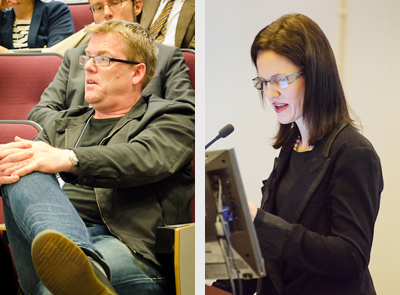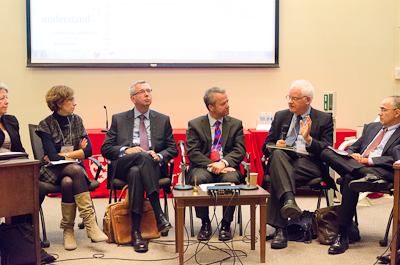The Faculty of Law held a major international conference on legal education September 28 and 29, in celebration of the tenth anniversary of McGill’s unique BCL/LLB program.
Entitled “Stateless Law? The Future of the Discipline,” it was an occasion for prominent academics from around the world to gather at McGill and thrash out how this “transsystemic” program has changed our understanding of law as a discipline, and where legal education should go next.
“I was very happy with the conference,” says Professor Lionel Smith, director of the Paul-André Crépeau Centre for Private and Comparative Law (formerly the Quebec Research Centre of Private and Comparative Law), which organized the meeting. “We had 179 participants and presenters, representing five Canadian provinces, nine E.U. member states, Israel, the US and Japan,” he reports. There were two full days of panel discussions and round-tables, with many memorable papers presented by professors from the world’s top law schools. “The three plenary speakers made a very strong impression,” said Smith.
|
|

|
The first, on Friday morning, was Ernest Weinrib, the Cecil A. Wright Professor of Law at the University of Toronto. His key ideas were brought into several of the later sessions, about which he quipped, “Someone told me, ‘wow, Ernie, you set the tone.’ I said, ‘no, I provided the target!’”
The second plenary session, which closed the first day, was led by Annelise Riles, the Jack G. Clarke Professor of Law in Far East Legal Studies and Professor of Anthropology at Cornell University (New York), who addressed the issue of “Market Totalitarianism” in relation to the recent financial crisis.
And finally, John Gardner, Professor of Jurisprudence in the University of Oxford, delivered a provocative final plenary lecture on Saturday afternoon, in which he spoke out “Against Legal Pluralism.” Gardner “challenged the audience to consider whether every normative order was properly described as legal,” said Smith, “and whether legal pluralism was a theory about the nature of law, or a claim about the overlapping normative orders that exist.”
In between, the scholars discussed the place of law in the university, various dimensions of legal pluralism, international law in the era of globalization, transnational commercial law in the light of human rights norms, and many more salient threads on the subject of legal education.
It was an event that drew in over 60 current students at the Faculty, as well more than 30 of our professors, as participants and presenters. The Faculty also welcomed back two former Deans, Stephen Toope, now the President of UBC, who participated in a panel on the place of the law faculty within the university, and the honorable Nicholas Kasirer, a Justice at the Quebec Court of Appeal, who served as commentator for a panel on law’s relationship with other disciplines.
Former students of the program also returned for the occasion, including Mayo Moran (LLB’90), now Dean of Law at the University of Toronto, presenters Geneviève Painter (BCL/LLB’06), Finn Makela (BCL/LLB’04) and Derek McKee (BCL/LLB’06), as well as Neil Hazan (BCL/LLB’02), a partner at Borden Ladner Gervais LLP, which was a conference sponsor, and many more alumni.
David Sandomierski (BCL/LLB’08) was one of these. “I was struck by Stephen Toope’s eloquent argument that law schools must pay more attention to the moral development of law students,” said Sandomierski a SJD Candidate at the University of Toronto Faculty of Law. “The conference also helped me to realize how McGill’s program is not just an innovative response to Montreal’s distinctive, hybrid legal culture, but that it can also serve as a model for legal educators elsewhere.”
Indeed, as University of Turin professor Michele Graziadei remarked during one panel discussion, “it’s often stated that the McGill model is unique and linked to the soil of Montreal. I suspect that is not the case. The McGill experience has a special significance for Europe, regarding the problem of integrating different traditions.”
In the end, the theories discussed at this academic conference will have a practical impact, as law professors’ concept of legal education will, quite directly, shape the world’s future lawyers.
And besides, as conference organizer Lionel Smith reminds us, “There’s nothing so practical as a good theory.”
-Story by Bridget Wayland
-Photos by Lysanne Larose

